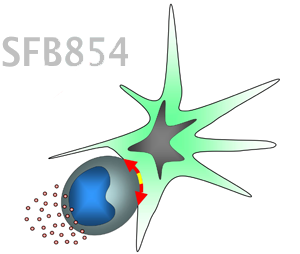Inter- and intracellular communication is necessary for the proper functioning of the immune system. During the defence against pathogens, cells of the innate and adaptive immune system (granulocytes, macrophages, mesangial cells, dendritic cells, T cells, B cells and epithelial cells) communicate with each other to prevent the expansion and spreading of microbes such as bacteria, viruses or fungi. Alterations of cellular communication can cause immunological disorders, such as immunodeficiencies, autoimmune diseases or allergies. Furthermore, alterations of immune cell functions also impair the ability of the immune system to detect and to eliminate malignant transformed cells.
Hence, assessing the question, how inter- and intracellular communication processes between immune cells are regulated on the molecular level is of central importance to understanding both physiological and pathophysiological immune reactions. In addition, these investigations provide opportunities to develop new substances that can then be used to manipulate the immune system.
During the 12.5 years of funding by the DFG, the Collaborative Research Center 854 aimed to elucidate the molecular processes that regulate inter- and intracellular communication within the immune system by applying state of the art biochemical, cell and molecular biological techniques. In addition, we developed and applied new techniques for molecular and intravital microscopy to facilitate the analysis of cellular communication processes during physiologic and pathophysiologic immune reactions. more
